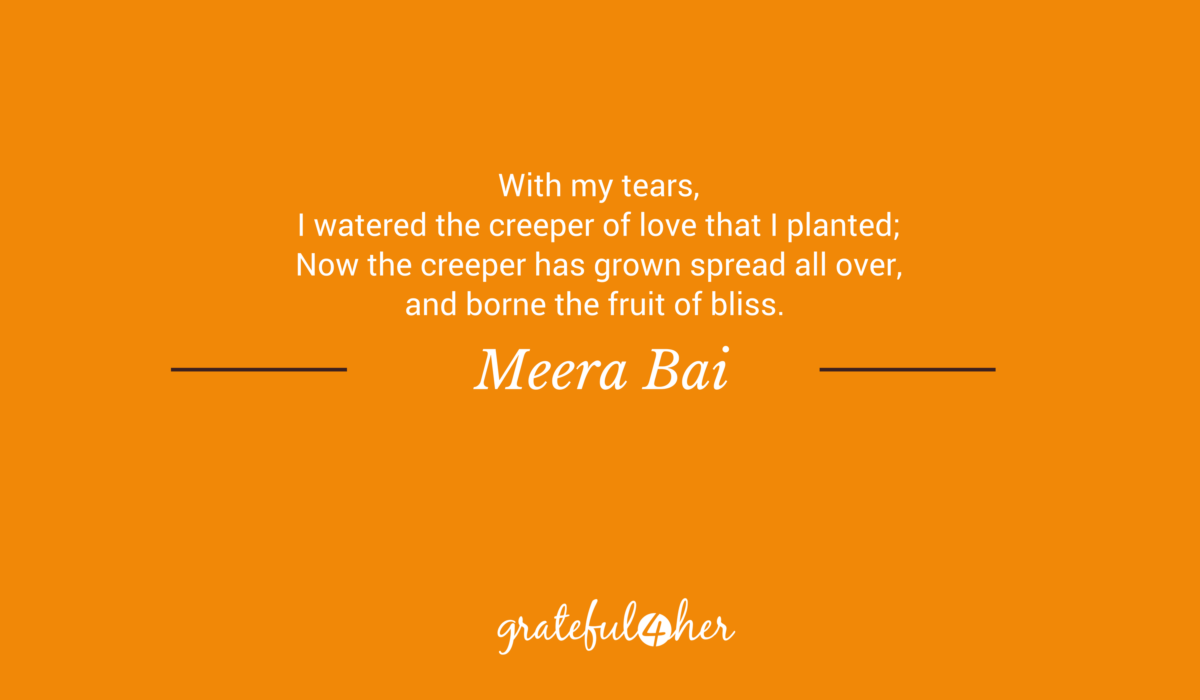The Family of Meera Bai
Meera Bai also known as Meera was born into a privileged Hindu family. She forsook the expectations of a princess and spent her time as a mystic and devotee of Krishna. She was born into a Rathore royal family of Kudki district of Pali, Rajasthan, India. She is mentioned in Bhaktamal, confirming that she was widely known and a cherished figure in the Indian bhakti movement culture by about 1600 CE.
The Legacy of Meera Bai
Meera Bai was a 16th-century Hindu mystic poet and devotee of Krishna. She is celebrated as a poet and has been claimed by the North Indian Hindu tradition of Bhakti saints. She helped revitalize the tradition of bhakti (devotional) yoga in India.
Her poems are lyrical padas (metric verses). While thousands of verses are attributed to her, there are no surviving manuscripts of her poetry from her century, and the earliest records with two poems credited to her are from early 18th-century, more than 150 years after she died. The largest collection of poems credited to her are in 19th-century manuscripts. Scholars have attempted to establish authenticity based on both the poem and Mīrābāī being mentioned in other manuscripts as well as from style, linguistics and form.
Composer John Harbison adapted Bly's translations for his 'Mīrābāī Songs'. There is a documentary film 'A Few Things I Know About Her' by Anjali Panjabi. Two well-known films of her life have been made in India, 'Meera (1945)', a Tamil language film starring M. S. Subbulakshmi, and 'Meera' a 1979 Hindi film by Gulzar. TV series, 'Meera' (2009–2010) was also based on her life. Mīrābāī's life has also been interpreted as a musical story in 'Meera—The Lover', a music album based on original compositions for some well known Meera bhajans.
Her poems are lyrical padas (metric verses). While thousands of verses are attributed to her, there are no surviving manuscripts of her poetry from her century, and the earliest records with two poems credited to her are from early 18th-century, more than 150 years after she died. The largest collection of poems credited to her are in 19th-century manuscripts. Scholars have attempted to establish authenticity based on both the poem and Mīrābāī being mentioned in other manuscripts as well as from style, linguistics and form.
Composer John Harbison adapted Bly's translations for his 'Mīrābāī Songs'. There is a documentary film 'A Few Things I Know About Her' by Anjali Panjabi. Two well-known films of her life have been made in India, 'Meera (1945)', a Tamil language film starring M. S. Subbulakshmi, and 'Meera' a 1979 Hindi film by Gulzar. TV series, 'Meera' (2009–2010) was also based on her life. Mīrābāī's life has also been interpreted as a musical story in 'Meera—The Lover', a music album based on original compositions for some well known Meera bhajans.
Why we are grateful4her
Meera Bai lived love for her God, her religion and the life she wanted to lead irrespective of the social convention she was born into. Her message of freedom, her resolve and right to pursue her devotion to deity Krishna and her spiritual beliefs as she felt drawn to despite her persecution. Her influence in Indian culture emerges, through her legends and poems, as a person who stands up for what is right and suffers bitterly for holding fast to her convictions, as other men and women have' yet she does so with a language of love whether between human beings or between human and divine.
Legends about Meera Bai mention her fearless disregard for social and family conventions, her devotion to god Krishna, her treating Krishna as her husband, and she being persecuted by her in-laws for her religious devotion. In her poems, Krishna is a yogi and lover, and she herself is a yogini ready to take her place by his side unto a spiritual marital bliss. Meera Bai style combines impassioned mood, defiance, longing, anticipation, joy and ecstasy of union, always centered on Krishna.
Legends about Meera Bai mention her fearless disregard for social and family conventions, her devotion to god Krishna, her treating Krishna as her husband, and she being persecuted by her in-laws for her religious devotion. In her poems, Krishna is a yogi and lover, and she herself is a yogini ready to take her place by his side unto a spiritual marital bliss. Meera Bai style combines impassioned mood, defiance, longing, anticipation, joy and ecstasy of union, always centered on Krishna.
Interesting Facts
According to a popular legend, her in-laws tried many times to execute her, such as sending her a glass of poison and telling her it was nectar or sending her a basket with a snake instead of flowers. According to the hagiographic legends, she was not harmed in either case, with the snake miraculously becoming a Krishna idol.



